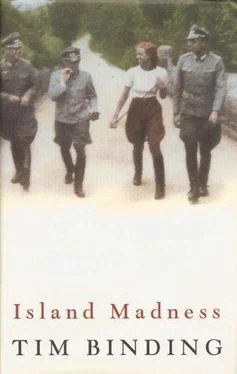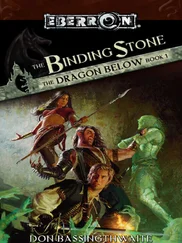The two men laughed and walked to the bottom of the garden. The Major put his hand on the gate and blew the smoke into the clear air.
“Fantastic,” he said, looking up. “On such a night one wants to pretend for a moment that one is free, that the world is still and at peace.”
“I used to go canoeing on nights like this,” Ned confessed, “take my girlfriend, sleep out on one of the outlying islands.” He caught the Major’s questioning look. “No, never Isobel. We just went swimming. She was afraid of the water after her mother died. I helped her get over it. That’s how we…”
“And I taught her how to dive. She could not do that before, I think.”
“No. With me she’d jump in, both feet.”
“Holding her nose, yes?”
“That’s right.”
The two men bowed to their private thoughts, then sensing each other, looked to the sky again, waiting for the conversation to take a new direction.
“Do you have the canoe still?” the Major asked. He felt Ned’s hesitation. “No, no. Do not answer me. I do not want to know.”
“You know already, Major.”
“Of course.” He dropped the cigarette end and crushed it with his foot. “You must be clever at hiding things. I thought we had searched all your houses.”
Ned walked over and pulled it out from the back of the pigsty. He laid it out on the ground and unfolded the two lengths. The Major walked around it.
“It is quite large.”
“That’s the beauty of it. Folded up it takes up hardly any space at all.”
“No wonder we missed it.”
“There was a pig here then. That helped.”
“You ate him?”
“No, you did.” The Major started to protest. “Soldiers,” Ned explained.
Lentsch bent down and brushed the straw and dirt from the skin.
“Why don’t we try now?”
“What?”
“Now. Let us row across the water.”
“We couldn’t.”
“Yes, we could. You said yourself, this is a night for sailing. I want to go, Ned. For me the island has lost her beauty. Perhaps seeing it like this will restore it for me. I would like to think of the island as beautiful again.”
Ned grunted in acknowledgement.
“What if we get caught?”
“If we are stopped I shall say I was testing the efficiency of our patrols. They would understand that. Will we be caught?”
“Probably not. If we strike out past the promontory a good distance we should be all right. There’s no moon to speak of and we’d be very low on the water. Patrol boats would be our main worry, but we’d hear them quite some way off.”
Lentsch gripped his arm. “Come on, then!” he exhorted. “Put our differences aside. Circumnavigate the island, true explorers of the night.”
They hoisted it up on their shoulders and carried it out onto the road. The Major starled to trot down the narrow lane. He was eager, like a child, willing danger to emerge. He is crazy, Ned thought, and I am mad to be a part of it. When they reached the beach and the long road that ran alongside it, they jumped down, resting against the old sea wall along the length of the bay. The Major started to giggle.
“If the Captain could see me now,” he said. “A canoe! All these sentries and watchtowers defeated by a canoe!”
Half bent, they moved along in the shadow of the wall, before setting the craft down where the bay jutted out in a cluster of spilt rock. They waded out slowly, the craft bobbing under their hands, the water cold, the sand untrustworthy. Half a mile away on the opposite side they could see the dim outline of an observation post. To the west, across the sea, the sky hung low. There was nothing to see but the vast and empty dark, no sound except the lap of the waves and the long lonely wind. Ned held the craft steady while the Major clambered in, then pushed. As he fought to keep his balance he thought he was going to tip them both in the water, but then he was in, his legs tucked under the prow. He took up the paddie and sent them spinning out over the water.
“This is marvellous,” Lentsch called, holding his paddie out like a tightrope walker.
“Shh.” Ned whispered. “Voices carry, you know. Just do like me and hope the moon doesn’t show.”
It was a rolling world that Ned seemed to lead him into, and as they moved over its looming surface Lentsch felt as if they were sailing over a sleeping giant, feeling the motion of breathing deep and slow. It was a quiet world, despite the great whistling dark, without limit, without feeling, a world where there was only the choice of existence or oblivion; nothing in between. Isobel was here, riding in the stinging spray blowing in his face, and in the murky inlets that fled by, he could see the hidden marshes of his youth, murmuring with the fluttered ruffling of disturbed birds. Here, past the swept bays and scattered rocks, was a world washed free of men, a world immune to their cries; no reason here, no love or enmity; no emotion at all, except the wondrous surge of being. Was he cold, was he soaked to the bone? He did not know. He was not the Major, he was not Isobel’s lover, for there were no lovers or majors on this water. Even the man in front of him, who was he? An unknown! What connection did he have with him? None! Here, no one had any connection with any one or any thing. And it came to him that he did not want to exist in any other state than this: that to ride under the stars would be enough, to ride and feel the great indifferent power of the world carry you where it would, with it having no thought to you and with you having no thought to it.
He plunged his paddie in and felt the great suck of the water hold him fast as the paddie sank and stuck like a spoon drawn through syrup. He fought to raise it. Ned looked back.
“Nice and easy, Major, that’s all she needs.”
“Sorry.”
He worked the paddie lightly, trying to imitate the shadow of the man in front of him, feeling the canoe veer left and then right, left and then right, beginning to judge the depth of the blade and the swing of his arm. He was gliding forward now, gliding forward, feeling the strength of himself and his seat hard on the slatted floor, conscious of the slow welling below him and the thin, untested membrane that kept him suspended from the dreadful deep. It was black now, very black and he began to feel alone, a little afraid. Lentsch wasn’t even sure whether he could see the island at all. Surely there had been a jut of rock over there? And where was the long curve he had seen and the watchtower rising above?
Ned laid his paddie across his knees.
“We can rest up a bit,” he said.
The Major span round in his seat, panicking.
“Which way are we facing?” he asked.
Ned lifted his paddie to the stars.
“North. Towards England.”
“Are we moving at all?”
“Faster than you think.”
“I feel lost.”
“You’re not lost.”
“Have you ever been out like this before?”
“Since you arrived? Only once. I nearly didn’t come back. Kept on rowing. But I couldn’t.”
“Your mother?”
“Not just her. It was like the whole of Guernsey wouldn’t let me go, every lump of rock dragging me back. I wanted to go. I could feel the current almost willing me. It would have only taken me six or seven hours. I got so far out and then stopped. I couldn’t go any further. Every time I raised the paddie it was like there was this great magnet dragging me back.”
Lentsch shivered.
“It is like a frozen landscape, I think, the sea at night. There seems no end to it. If we died here, by some misfortune, though I might feel alone, I would not feel abandoned. It would be part of my destiny, to die here. But many men I know have died in seas much more terrible than this, seas of ice and frozen mud. They were not only alone. They were betrayed. Ah, Ned, the stories I have been told.”
Читать дальше












